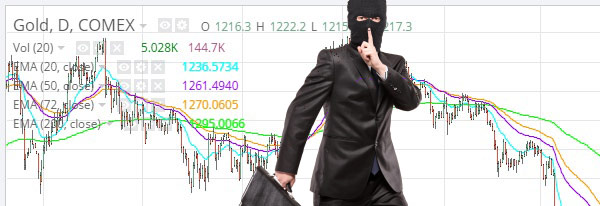The idea of gold price manipulation, within the gold bug community, is considered by many to be a proven, non-controversial fact. But, for the person wanting to buy gold as an inflation hedge or as insurance against bad monetary policy, does gold price manipulation really matter?
 Bullion.Directory precious metals analysis 29 September, 2014
Bullion.Directory precious metals analysis 29 September, 2014
By Terry Kinder
Investor, Technical Analyst

At the top, they saw nothing but higher prices. As prices fell, each bounce was seen as the beginning of a renewed raging bull market. In December 2013 they called yet another market bottom. Now, some of them are getting nervous as the gold price remains near $1,200.00.
The experts, and advocates of gold price manipulation, have fallen into a trap of their own making. One the one hand, they argue for gold price manipulation. On the other hand, they believe they can predict when gold prices will make new lows and highs. This leads to a question.
If gold price manipulation is taking place, how could anyone but the manipulators know what the future price will be? In the end, all this time spent discussing gold price manipulation serves only to confuse some, discourage others, and distract many from the sound reasons for owning and holding physical gold.
Dimitri Speck on gold price manipulation
Dimitri Speck of Seasonal Charts has done extensive work looking at gold price manipulation. Late last year his book, The Gold Cartel came out and made the case that gold price manipulation has occurred and is still happening today. From the book description:
In The Gold Cartel, seasoned commodity analyst Dimitri Speck illustrates in detail how central banks have secretly manipulated the price of gold in an effort to calm financial markets and control inflation. Using quantitative analysis of historic gold market patterns, the author shows how and when central banks intervene in gold markets, and how this has affected price movement and impacted the global financial markets, leading to the creation of a mega-bubble.
Speck, in November of last year, sat down for a two part interview with Lars Schall in what I have named “The Woodshed Interview”. Watch the two videos and you’ll see why:
Dimitri Speck and Lars Schall – Gold Taken to the Woodshed Part 1
Dimitri Speck and Lars Schall – Gold Taken to the Woodshed Part 2
![Gold Price Manipulation: Central Banks love to take the yellow metal out behind the woodshed.By National Park Service inventory [Public domain], via Wikimedia Commons](http://upload.wikimedia.org/wikipedia/commons/e/ec/Belly_River_Ranger_Station_woodshed.jpg)
Gold Price Manipulation: Central Banks love to take the yellow metal out behind the woodshed. By National Park Service inventory [Public domain], via Wikimedia Commons
Michael S. Rozeff on gold price manipulation
While some believe in gold price manipulation, others do not. Michael S. Rozeff, believes the gold market is too large to be manipulated to any serious extent. Rozeff writes:
In my opinion, the gold market is too large to be manipulated to any serious extent. While there are many allegations of manipulation, no one has ever shown that there is manipulation that has made any lasting impact on the price of gold. By “shown”, I mean scientifically according to rigorous standards. One serious paper finds no such gold price manipulation. The same author looks at possible manipulation in the London gold spot price announcements. Even if this price is dirty to some extent or at some dates and gamed so as to place certain options in or out of the money, how dirty can it be for the ongoing prices of gold in view of the many players and their wealth? Not enough to worry about, probably close to normal spreads and volatility.
Rozeff later continues:
I believe that it’s foolhardy to make a gold investment based on the idea that gold prices are too low because the market is rigged. It’s also foolhardy to sell gold on the basis that the price will be manipulated further downwards. I believe it’s sensible to buy or not buy gold or sell gold for any number of reasons, including one’s assessment of its fundamental value; but I do not advise including the idea that the price has been artificially suppressed by such significant amounts in making one’s fundamental assessments.
A little later Rozeff writes:
I cannot prove that gold at $1900 an ounce in September of 2011 was overpriced substantially, although I believe it was. I also believe that gold was underpriced back in 1999 and 2000. I do not say that it is not underpriced at present, or conversely that it’s overpriced. What I say is that considerations of market manipulation should not be factored into one’s assessment of gold’s fundamental worth.
Let not this warning about assessing fundamental value leave the impression that this is the only guide in speculation. I place a great deal of weight on so-called “technical analysis”. There are many possible tools of technical analysis, and one must inevitably choose what to use and what not to use. This is another story entirely.
Many will disagree with Rozeff regarding gold price manipulation not being possible to any serious extent. In my opinion, he has a very valid point that it’s not wise to invest in gold just because you believe that manipulation has forced the price down too low. Sure, you can argue that, eventually, gold price manipulation will fail and send prices higher.
However, at the same time, if prices are being manipulated downward, why can’t they be manipulated even lower? If today’s manipulated price is good, won’t tomorrow’s lower manipulated price be even better? I also agree with Rozeff that technical analysis can be an effective tool to evaluate the price of gold. It also seems odd, at least to me, that technical analysis is still useful when the gold price is said to be heavily manipulated.
Gold price and currency collapse
Returning to our gold experts, a number of them pair predictions of a currency collapse with record high gold prices. For example, Harvey Organ predicts $200 silver and $10,000-$12,000 gold by January 2015. Andrew Maguire believes that gold and silver are in the final stages of capitulation, due in part to the Shanghai Gold Exchange and other physical metals markets in the east. These predictions, and others like them, imply that gold price manipulation will soon end, to be followed by much higher gold prices.
It is a subject that has been discussed exhaustively since at least 1997. Many of the biggest insights were put forward by the mysterious “Another” seventeen years ago.
The simple fact is that many of the gold price manipulation ideas are almost unchanged from when Another popularized them in the 1990’s. Much of what Another wrote was cryptic, but the book “Thoughts” of “Another” Explained: New Paradigms for the Gold Market helps explain much of what “Another” wrote.
All of which leads us back to the question, does gold price manipulation matter?
To a large extent, much of what has been predicted about the collapse of the current monetary system and the expected higher gold prices is still pending.
Yes, gold prices have made a strong run since 2000, but the inflation adjusted gold price has still not broken the 1980 high.
But, gold price manipulation isn’t a good reason to buy or sell gold. The fact that gold, when adjusted for inflation, is still lower than the 1980 high isn’t that important either. The truly important reasons to buy and hold physical gold are:
These are but a few good reasons to buy and hold physical gold. None of them focuses on gold price manipulation, imminent US Dollar collapse or predictions of $10,000 gold in a few short months.
I think all of the talk of gold price manipulation just ends up confusing, distracting, and ultimately disappointing many who are new to the gold community and would benefit from buying and holding physical gold.
Bullion.Directory or anyone involved with Bullion.Directory will not accept any liability for loss or damage as a result of reliance on the information including data, quotes, charts and buy/sell signals contained within this website. Please be fully informed regarding the risks and costs associated with trading in precious metals. Bullion.Directory advises you to always consult with a qualified and registered specialist advisor before investing in precious metals.











 Material provided on the Bullion.Directory website is strictly for informational purposes only. The content is developed from sources believed to be providing accurate information. No information on this website is intended as investment, tax or legal advice and must not be relied upon as such. Please consult legal or tax professionals for specific information regarding your individual situation. Precious metals carry risk and investors requiring advice should always consult a properly qualified advisor. Bullion.Directory, it's staff or affiliates do not accept any liability for loss, damages, or loss of profit resulting from readers investment decisions.
Material provided on the Bullion.Directory website is strictly for informational purposes only. The content is developed from sources believed to be providing accurate information. No information on this website is intended as investment, tax or legal advice and must not be relied upon as such. Please consult legal or tax professionals for specific information regarding your individual situation. Precious metals carry risk and investors requiring advice should always consult a properly qualified advisor. Bullion.Directory, it's staff or affiliates do not accept any liability for loss, damages, or loss of profit resulting from readers investment decisions.

Great piece. It’s funny when you think about it. There is speculation is all areas of trading, but soft commodities and other metals are traded largely on fundamentals. Inventories drop on demand, prices go up. Poor weather limits sugar crops, prices go up. Oversupply of soybeans, prices go down.
However, in gold and silver somehow we find it acceptable that their price be determined by banks who can openly trade their decision making. Barclays, a member bank, was fined 25 million pounds for gold manipulation, and they’re still a member bank (not to mention interest rates and other products they were found guilty rigging).
I say let gold trade on open demand, and if gold truly falls then so be it. But regarding the countless news on higher physical demand while prices fall, we know it’ll take a 2008-scenario to boost it again.